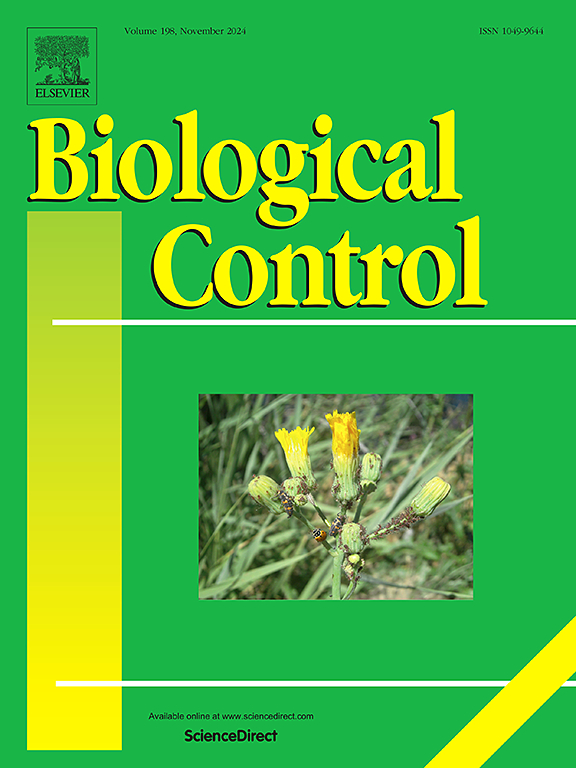Role of tomato plant-derived food sources on Dolichogenidea gelechiidivoris, parasitic wasp of Tuta absoluta
IF 3.7
2区 农林科学
Q2 BIOTECHNOLOGY & APPLIED MICROBIOLOGY
引用次数: 0
Abstract
Tuta absoluta (Meyrick) (Lepidoptera: Gelechiidae) poses a significant threat to tomato crops worldwide. Following its detection in the Mediterranean basin, considerable efforts have been made to develop biological control programs against this pest. The larval parasitoid Dolichogenidea gelechiidivoris Marsh (Hymenoptera: Braconidae) is widely distributed in northeastern Spain and has shown promise as a natural enemy in this region. Recent studies have demonstrated that access to floral nectar can improve the biological parameters of this parasitic wasp. However, the effects of other plant-derived food sources available in tomato crops, such as plant guttation and honeydew, have yet to be explored. This study assessed the impact of plant guttation and the honeydew of two phloem-feeding insects, Myzus persicae (Sulzer) (Hemiptera: Aphididae) and Bemisia tabaci (Gennadius) (Hemiptera: Aleurodidae), on the fitness (longevity and fecundity) and performance (parasitism and sex ratio) of D. gelechiidivoris under controlled laboratory conditions. Our results demonstrated that both honeydews enhanced the fitness and performance of this parasitoid, while tomato plant guttation did not have an effect on its fitness and negatively impacted parasitism. These findings highlight honeydew as a potential food source in integrated pest management (IPM) strategies. Further research is recommended to explore the specific chemical composition of tomato plant guttation and its broader effects on beneficial insects in tomato systems.
番茄植物源食物源对番茄大黄蜂的作用
番茄绝对灰蛾(鳞翅目:蠓科)对全球番茄作物构成严重威胁。在地中海盆地发现这种害虫后,人们为开发针对这种害虫的生物防治方案作出了相当大的努力。小寄生蜂(膜翅目:小寄生蜂科)广泛分布于西班牙东北部,是该地区的天敌。最近的研究表明,接触花蜜可以改善这种寄生蜂的生物学参数。然而,番茄作物中其他植物性食物来源的影响,如植物内脏和蜜瓜,还有待探索。在实验室控制条件下,研究了两种韧皮部取食昆虫——桃蚜螨(半翅目:蚜虫科)和烟粉虱(半翅目:粉虱科)的植物吸食和蜜露对gelechiidivoris的适合度(寿命和繁殖力)和性能(寄生率和性比)的影响。结果表明,两种蜜露均能提高该寄生蜂的适合度和寄生性能,而番茄植株灌浆对其适合度没有影响,并对寄生产生负向影响。这些发现强调了蜜露作为害虫综合治理(IPM)策略的潜在食物来源。建议进一步研究番茄植物内脏的具体化学成分及其对番茄系统中有益昆虫的更广泛影响。
本文章由计算机程序翻译,如有差异,请以英文原文为准。
求助全文
约1分钟内获得全文
求助全文
来源期刊

Biological Control
生物-昆虫学
CiteScore
7.40
自引率
7.10%
发文量
220
审稿时长
63 days
期刊介绍:
Biological control is an environmentally sound and effective means of reducing or mitigating pests and pest effects through the use of natural enemies. The aim of Biological Control is to promote this science and technology through publication of original research articles and reviews of research and theory. The journal devotes a section to reports on biotechnologies dealing with the elucidation and use of genes or gene products for the enhancement of biological control agents.
The journal encompasses biological control of viral, microbial, nematode, insect, mite, weed, and vertebrate pests in agriculture, aquatic, forest, natural resource, stored product, and urban environments. Biological control of arthropod pests of human and domestic animals is also included. Ecological, molecular, and biotechnological approaches to the understanding of biological control are welcome.
 求助内容:
求助内容: 应助结果提醒方式:
应助结果提醒方式:


